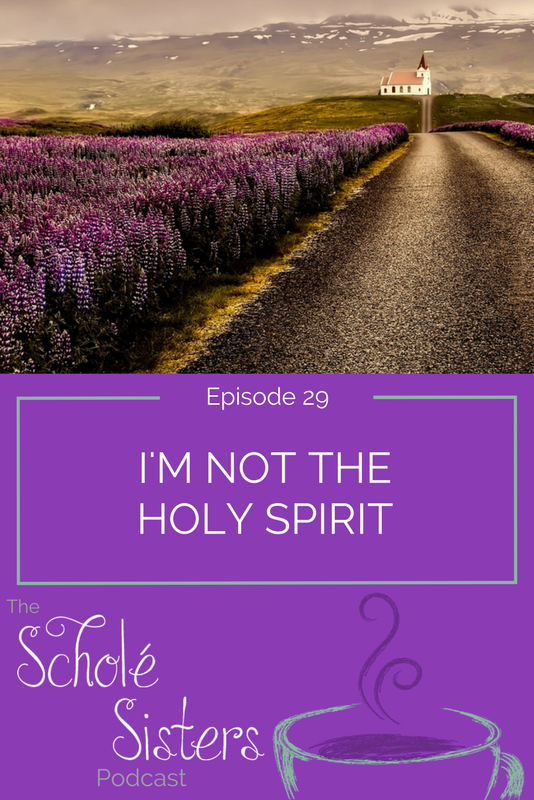SS #29: Educating for Virtue (I’m Not the Holy Spirit)
Mystie and I are pleased to welcome Eric Hall as our guest today. Eric is a classical scholar and teacher who is local to Brandy. That’s right! She gets to know him in real life. Eric has studied at The Master’s College, the University of St. Andrews in Scotland, and Clemson University. When he’s not reading Thomas Aquinas, Eric enjoys mountaineering and rock climbing.
Today’s episode is our attempt to balance two ideas. On the one hand, we have grace – this beautiful free gift of God. On the other hand, we have virtue, and our pursuit of it. Shouldn’t virtue come to us directly from God? And if so, why would Christian classical education say that virtue is the goal of education? Eric is kind enough to help us sort these questions out….

Thank you to our sponsor:
This episode is sponsored by The Simplified Email Course. Email is a modern day necessity, but it is so easy for it to get out of hand. Need to get your email inbox under control? Mystie’s got you covered. From now through December 2017, you can get The 5-Day Simplified Email Course (usually an exclusive for Work the Plan Premium members) for free!
This course provides real-life, practical, down-to-earth help for stressed out and worn out women ready to get organized and take control of their responsibilities. Moms can’t leave the email hacks and management advice to productivity gurus. Even we need to manage our email inboxes. This 5-day email-delivered course will take you from inbox insanity to inbox incredible, step by step. Click here to join for free through December 2017. (After that, it will return to being a component of Work the Plan Premium.)

[convertkit form=5102043]
Listen to the podcast:
Podcast: Play in new window | Download
Show Notes:
- Scholé RDA (now known as Scholé Every Day)
- Mystie:
Ancient Mediterranean by Michael Grant
- Eric:
The Summa Theologica by Thomas Aquinas
The Supper of the Lamb by Robert Capon
- Brandy:
Les Misérables by Victor Hugo
Les Miséerables on Audible
- Mystie:
- Topical Discussion: I’m Not the Holy Spirit — a discussion about grace and the development of virtue
Early Christianity and Greek Paideia by Werner Jaeger
The Great Tradition by Richard Gamble
- The Triumph of St. Thomas Aquinas fresco photos
- Heidelberg Catechism
Norms and Nobility by David Hicks
- Of Education by John Milton










This is great — talk about stirring some deeper thought.
And Eric, he should be in radio. His voice is so perfect sounding!
This episode answered so many of my own questions regarding habits of virtue. Thank you! Do you have any current book recommendations on this specific subject?
One book I would recommend, that I found helpful when I read it a couple summers ago, is John Milton: Classical Learning and the Progress of Virtue by Grant Horner. It’s funny because before I read it, I didn’t think I liked John Milton very much as a person (even though I appreciated his poetry). It changed my view of him! It is also a great little primer of thoughts on virtue. It didn’t answer all of my questions, but it definitely gave me much to think about. 🙂
Eric gave a beautiful, learned, and wise reflection on virtue, the tradition, and our call to live as God has made us: full of the grace we need to be good. Thanks for inviting him to the show.
While Eric was talking about untested virtue, I kept thinking of Lord Jim by Joseph Conrad. Have any of you SS ladies read that book? It was weird and wonderful.
No! Should I? I’m intrigued!
Hmmm, interesting episode. As a disclaimer, the reformed Christian theology terms are foreign to me, so I can’t comment intelligently on that part.
I think that what made this conversation uncomfortable to me was the idea of parents or teachers testing virtue in their children. Eric Hall tries to make a distinction that we aren’t literally measuring virtue in a laboratory or through some sort of written test, but rather observing our children in every day life–maybe he should have stopped there and just chosen to proceed with the word “observe” rather than “test.” Life, as he says, provides ample tests without setting up more tests on purpose. While we should provide our children with fertile experiences for growth, that’s not the same as testing.
Also, I think that he diminishes the role of the parent too much. There is ample evidence available in sociology and psychology that shows that different forms of parenting have tremendously different impact on the outcome of the child. Yes, at the end of the day, the child has to make his own choices, but we wouldn’t be homeschoolers (as just one example) if we all didn’t know it makes a real difference in outcome.